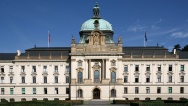Press Advisories
21. 12. 2016 22:51
Prime Minister Bohuslav Sobotka’s ten top priorities for 2017
“The coalition government, which we have managed to hold together the three years now, has delivered political stability and economic growth to our country and made progressive improvements in our citizens’ standard of living. The Government has another 10 months to go before its term of office comes to an end. We must not let our energy fade or our momentum slip. We must harness the time fully in order to complete the Government’s work to the benefit of our citizens and country. One of the standout key priorities is the uptake of resources from European funds. The year 2017 will be absolutely crucial for the utilisation of funds in the new 2014-2020 planning period as this concerns our economic growth, jobs and modernisation. Another priority is to start work on key transport structures, such as the D11, D35, D6 and D3 motorways. It will also be necessary to push through the Social Housing Bill and complete the process for the law index-linking contributions for persons insured by the state. Another priority in my sights is an increase in the minimum wage and public-sector pay, and by extension and improvement in the standard of living,” said Prime Minister Bohuslav Sobotka.
The Prime Minister’s ten key priorities for 2017:
- To take up financial resources from European Union funds.
- To start work on the construction of vital transport structures for which EIA exemptions have been negotiated.
- To push through the Social Housing Bill.
- To push through the Backup Maintenance Bill.
- To push through the Bill on the Index-linking of Contributions for Persons Insured by the State.
- To push through the Free Legal Aid Bill.
- To push through the Bill on Public Non-profit Healthcare Facilities.
- To increase sickness benefit for the chronically ill in an amendment to the Health Insurance Act.
- To prepare an increase in the minimum wage in 2018.
- To continue increasing public-sector pay.
The Prime Minister today took stock of the work done by the Government and the commitments fulfilled in 2016. These include greater security for Czech citizens in the form of staged increases in the spending available to the Ministry of the Interior and the Ministry of Defence, including an increase in the number of security corps members and their pay conditions. Bohuslav Sobotka’s Government also placed an emphasis on social aspects. Pensions have increased and families enjoy tax concessions for second and any further children. The care allowance has also gone up by 10%. In addition, the Government is increasing pay in the public sector, e.g. among firefighters, police officers, soldiers, teachers and medical personnel. The Cabinet is actively grappling with the informal economy by introducing the electronic central registration of receipts and by enacting a law requiring proof of the origin of assets. In 2016, the present Government placed a stress on education, which saw the Schools Act take effect, along with a record increase in spending on science, research and sport.
Main Government commitments fulfilled in 2016:
1) Safety and security
A reduction in crime
The Czech Republic is the sixth safest country in the world. In 2016, the number of crimes fell year on year by 10.9%.
Czech assistance in the handling of migration
In 2016, the Czech Republic dispatched more than 500 police officers to assist with migration management in Macedonia, Serbia, Slovenia, and Hungary, including Frontex operations.
The Czech Republic earmarked CZK 263 million to assist those countries stricken by migration, including aid to reconstruct refugee camps in Iraq, Jordan and Turkey.
In addition, 15 medical teams were dispatched.
Increase in the number of police officers
Since 2014, the number of police officers has risen by 1,447.
Between 2016 and 2020, 4,000 police officers are to be recruited.
Improvements in the remuneration of security corps members
There was a 4% increase in pay grades effective from 1 November 2016.
Increase in the Ministry of the Interior’s budget
In 2016, the budget was increased by CZK 4 billion CZK 59 billion, with a further increase by CZK 4.3 billion to CZK 63.3 billion to come in 2017.
Increase in the Ministry of Defence’s budget
In 2016, the budget was increased to CZK 47.8 billion, with a further increase by CZK 4.7 billion to CZK 52.5 billion to come in 2017.
2) Social matters
Increase in pensions
In 2016, a one-off CZK 1,200 allowance was paid.
Pensions will go up by an average of CZK 308 from 1 January 2017.
Tax concessions for families with children
In 2016, the Income Tax Act increased the tax concession for a second child by CZK 1,200 and for a third and any further child by CZK 3,600 per year.
From 2017, these concessions will go up by CZK 2,400 and CZK 3,600, respectively.
Increase in care allowance
In August 2016, there was a 10% increase for all four levels of disability.
3) Pay rises
Teachers and non-teaching staff
From 1 September 2016, teachers were given an 8% pay rise, with a 6% increase in the tariff component of their pay; non-teaching staff saw their pay go up by 5%, with a 4% increase in the tariff component of their pay.
Security corps
From 1 November 2016, police officers, firefighters and public-sector workers were given a 5% pay rise, with a 4% increase in the tariff component of their pay.
Doctors and nurses
There was a pay rise by 5% in 2016.
From 2017, there will be a 10% increase in pay.
4) Grappling with the informal economy
Electronic central registration of receipts
The initial stage was launched on 1 December 2016.
Act on the Proof of Origin of Assets
Promulgated in the Collection of Legislative Acts on 3 October 2016.
5) Improved education
Schools Act
Effective from 1 September 2016.
Increased spending on research
In 2016, CZK 2.1 billion more than in 2015 was earmarked.
In 2017, there will be an increase by CZK 3.64 billion.
Record money for sport
In 2016, sports subsidies were increased by CZK 750 million to CZK 3.7 billion.
In 2017, there will be an increase to CZK 6 billion.
Increase in the capacity of nursery schools
Between 2014 and 2016, CZK 700 million was distributed, which pushed up capacity by 3,776 places in 150 classes.
In 2017 and 2018, a further CZK 300 million will be distributed.






